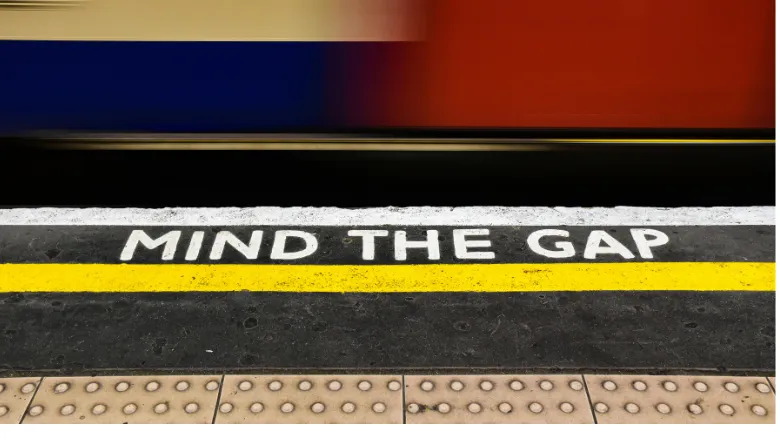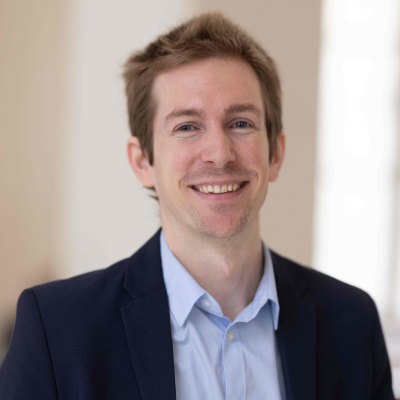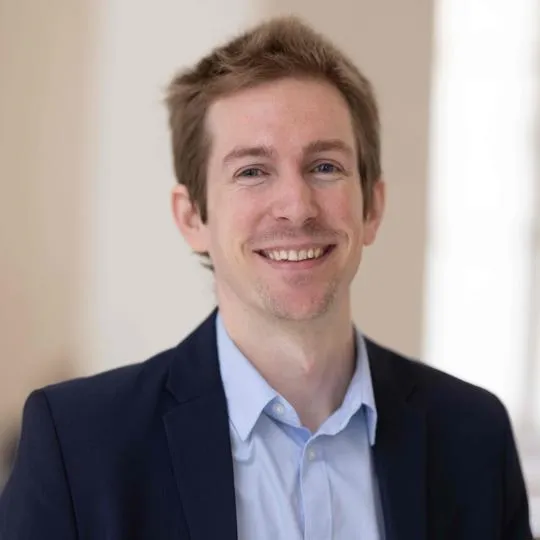28 April 2025
Bridging the gap in the circular economy: In conversation with Corentin Juin
Rosie Clemo with Corentin Juin
In this article, we interview visiting PhD candidate Corentin Juin about his current research into the circular economy, and how his time at the Centre for Sustainable Business helped shape his future research.

The circular economy (CE) has emerged as a key strategy for sustainable resource management. It promises to reduce waste, improve efficiency, and support long-term environmental goals.
At the same time, the Sustainable Development Goals (SDGs) offer a global blueprint for addressing social, economic, and environmental challenges. But how aligned are corporate sustainability initiatives with academic research on these topics?
Investigating this gap is Corentin Juin, PhD candidate in Management at Ecole polytechnique in France and a research consultant within the strategic consulting firm Square Management.
Corentin joined the Centre for Sustainable Business as part of a three-month PhD visiting program, where he furthered his research on circular economy and responsible innovation.
We sit down with Corentin Juin to learn more about his ongoing research and how it might help bridge the gap between academia and businesses.

Hi Corentin, thanks for joining us. Can you explain your research?
Bien sûr! I’m investigating the gap between theory and practice in businesses adopting circular economy principles and SDG's, alongside a PhD student from the University of Trento.
By analysing sustainability reports from the top 50 Fortune 500 companies alongside nearly 1,000 academic articles, our study uncovers critical discrepancies in language, priorities, and implementation strategies.
What kind of discrepancies are you uncovering?
There are many sustainability-related buzzwords shared between academia and businesses, but their interpretations and applications differ significantly.
Words such as "resource regeneration," "circularity," and "closed-loop systems" are both widely discussed, but seem to mean different things depending on who is saying it. While academia promotes radical shifts, businesses include them in their report often without specific or direct implications for their activities
There’s also a gap in priorities as well. Academic research tends to emphasise radical innovation, system-wide change, and long-term sustainability metrics. In contrast, corporate sustainability reports focus on near-term cost savings, incremental improvements, and regulatory compliance.
For instance, while researchers highlight the importance of ambitious strategies such as "remanufacturing" and "refurbishing" – which can significantly reduce material waste and extend product lifespans – corporate reports overwhelmingly prioritise end-of-line activities such as "recycling" and "waste reduction."
Seems like there’s a big language gap between academic and businesses at the moment. But what is the data saying?
Well, our study has found that while over 60% of academic papers explored high-level circular economy frameworks, less than 10% of corporate reports engaged with these ideas in depth.
When academics are discussing the circular economy, they often integrate SDG 9 (Industry, Innovation, and Infrastructure) and SDG 11 (Sustainable Cities and Communities) into their sustainability vision.
But these goals receive comparatively little corporate attention. Businesses are more aligned with SDG 12 (Responsible Consumption and Production) and SDG 13 (Climate Action), which are the most frequently cited in their reports.
The data clearly demonstrates that several of the Sustainable Development Goals are deeply interdependent (e.g. above mentioned SDG 9, 12 and 13), especially in their collective push toward greater circularity, a relationship that cannot be overlooked.
What does that mean for businesses?
Our study’s findings reveal that corporate sustainability strategies tend to favor "low-hanging fruit" – initiatives that are easy to implement and measure – rather than the transformative shifts championed in academia.
While this makes economic sense in the short term, it raises concerns about the long-term effectiveness of corporate sustainability efforts. If businesses continue to focus primarily on recycling rather than redesigning products and business models, are they truly advancing circularity or simply optimising waste management?
That’s a good point. Can we mitigate this through stronger policies and regulation?
That’s one way, yes. From a policy perspective, these insights suggest the need for stronger incentives to encourage businesses to adopt more ambitious circular strategies.
Regulations that promote extended producer responsibility, tax incentives for remanufacturing, and clearer standards for reporting circular economy initiatives could help bridge the gap between academic research and corporate practice.
Let’s talk about your time at the Centre. How did it support your study?
I joined the Centre as part of a three-month PhD visiting program, where I got the chance to engage with other PhD students, post doctorate researchers and professors at King’s College London. It really helped to refine my research and explore ways to strengthen the connection between academic sustainability frameworks and business implementation.
I took part in lots of seminars with practitioners, research presentations, and peer review sessions, and really enjoyed the exchange of ideas with fellow scholars and sustainability professionals.
Additionally, my research benefited from access to empirical data from Square Management, the strategic consulting firm sponsoring my PhD. Last but not least, the Centre provided a highly studious environment, offering some distance from my daily work and research in Paris, a priceless advantage at this stage of my research.
What do you hope the study will achieve?
I really hope, through highlighting the persistent disconnect between research and corporate sustainability practice, that our study contributes to an ongoing dialogue about how to make sustainability efforts more effective.
With the support of the Centre for Sustainable Business at King’s Business School, this research is contributing to stronger academic-industry collaboration – ensuring that the circular economy and SDGs are not just theoretical ideals, but actionable strategies that drive real change.
What’s your next steps?
I hope to finalise and publish this research as the third paper of my ongoing article-based PhD. I have submitted the draft for presentation at the International Conference of the Hellenic Society for Circular Economy (HSCE), where it was accepted. Following the conference, my co-author and I will refine the paper based on the feedback we receive, aiming to submit it for publication in either Business Strategy and the Environment or Technological Forecasting and Social Change.
Thanks so much for joining us to share your work Corentin, and for being part of the Centre for three months. We look forward to following the progress of your research.
Thank you, Rosie, for this interview! A special thanks to the entire team at the Centre for making my stay such a wonderful and pivotal moment in my PhD journey.
*
Corentin Juin is a PhD candidate in Management at Ecole polytechnique in France, within the Management Research Centre (i3-CRG) and affiliated to the research chair Technology for Change. Corentin’s research investigates responsible innovation, focusing on integrating new tools and methodologies for fostering virtuous business models in innovations. He is also a research consultant within the strategic consulting firm Square Management.
*
This article was brought to you by the Centre for Sustainable Business. Find out more about our work here.


